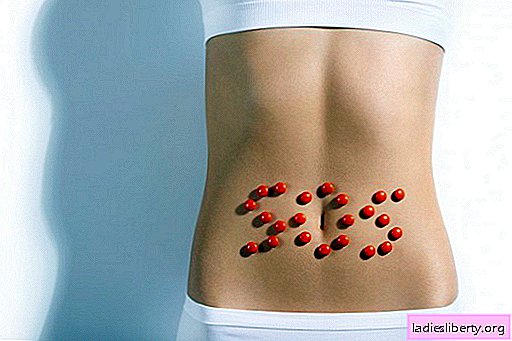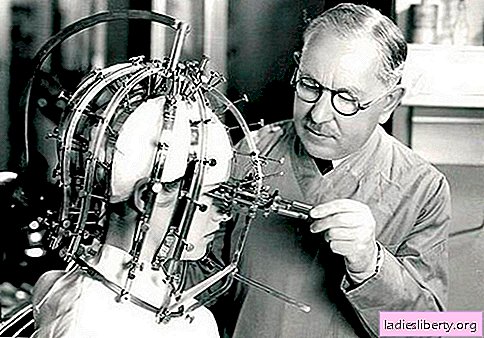
There is hardly any woman who feels the monthly joy of “critical days”. And if they have to stay at home and change the gaskets every hour, this is not a pleasant pleasure. Too abundant periods - is it dangerous, and how to create maximum comfort during an unpleasant process?
Abundant menstruation or what is menorrhagia
Menorrhagia is the medical term used to refer to too heavy periods. The process that delivers a lot of trouble is considered abnormal if it lasts more than 7 days, and the amount of discharge is more than 80 milligrams. It is easy enough to check whether very heavy periods take place. If the gasket has to be changed every hour or two, and at night, for the same reason, it is not possible to sleep, there are really too much discharge. Depending on the reasons, menorrhagia may be primary or secondary, accompanied by shortness of breath and severe weakness. To answer the question why abundant menstruation regularly annoy and deprive of working capacity, only a doctor can confidently, a visit to which should not be postponed until later.
Why there are heavy monthly
The reasons for the appearance of abnormally intense menstruation are numerous. Some of them represent a certain danger, so try to consider the most common.
1. Hormonal imbalance
Malfunctions in the normal functioning of the endocrine system most often occur at the beginning and at the end of the childbearing period. Abundant monthly causes of which are rooted in hormonal imbalance, annoy women at the beginning of menopause and teenage girls who are just entering adulthood. Acceptance of hormonal drugs, including contraceptives, increase menorrhagia.
2. Intrauterine devices
Abundant periods - the reasons may lie in the use of intrauterine contraceptives. Increased blood loss is extremely negative for the woman’s health, so the best way out is to remove the coil and use other methods of protection.
3. Endometriosis
In this pathology, the uterus enlarges, expands beyond its limits, and begins an independent existence in other tissues and organs. Painful and heavy periods with clots - a frequent sign of illness, and one-time uterine bleeding may occur.
4. Blood coagulation disorder
Disorders in liver activity, hereditary predisposition, and even the wrong menu can cause abnormalities. The predominance of fermented milk products on the table encourages the liver to produce enzymes that inhibit blood coagulation.
5. Inflammations of the pelvic organs
Abundant menstruation can accompany the infectious and inflammatory processes of the ovaries, uterus, fallopian tubes. The main symptoms are pain in the lower abdomen and lower back, prolonged and very abundant menses, and fever may occur. In the chronic form of the manifestation of the disease erased, however, menorrhagia is present.
6. Consequences of difficult labor
Too abundant periods after childbirth can be the result of complications of the birth process, inflammation, postpartum trauma, the presence of placenta residues. The bright color of the discharge indicates that this is probably not menstruation, but bleeding, so the doctor’s help will not be superfluous. Usually the cycle returns to normal after three months, then it can become more moderate and heavy periods after childbirth.
7. Congenital anomalies
The abnormal shape of the uterus, its doubling, the one-horned uterus - is not a complete list of why heavy periods every time make you feel discomfort. Improper structure often contributes to blood stagnation, as a result, heavy menstruation with clots and soreness constantly annoy.
8. Benign entities
The presence of polyps or uterine fibroids may be the answer to the question why abundant periods interfere with normal existence. With small sizes, polyps may not manifest themselves in any way, but if there are several of them or sizes are significant, many women complain of very heavy periods and the presence of spotting between the periods. Contact bleeding, whitening and cramping pain are additional signs of polyps. Similar symptoms, especially heavy periods with clots, are also characteristic of uterine fibroids, so a visit to the doctor will help make the correct diagnosis.
In addition to these reasons, they can cause heavy menstrual stresses, physical and emotional stress, vitamin deficiencies, heredity, regular intake of certain drugs (for example, aspirin).
Abundant monthly - diagnosis
You have plenty of periods - what to do in such cases can only be suggested by a gynecologist. Only a thorough examination and determination of the cause of the anomaly will allow you to prescribe the appropriate treatment. First of all, the doctor offers an ultrasound examination of the vagina. It is carried out from the 20th to the 25th day of the cycle and determine the growth of the mucous layer of the uterus. If its size exceeds 16 millimeters, endometrial hyperplasia is diagnosed. To confirm the diagnosis, hysteroscopy is done - monitoring the condition of the uterine cavity with a thin probe - and the level of hormones is checked by special tests. Hysteroscopy is performed only in the absence of an inflammatory process in the vagina.
The doctor asks in detail about previous events and complaints - how abundant menstruation, whether certain groups of drugs were taken, whether there were pregnancy and childbirth, and how they proceeded. Visual inspection is aimed at identifying various pathologies and inflammation, tumors and traumatic injuries. If necessary, a number of laboratory tests are appointed - blood tests for hemoglobin and coagulability, smear for cytological analysis. Well, if a woman keeps a monthly calendar, where regularity, abundance of discharge and duration are noted.
Abundant periods - effective treatment
Do not ask your neighbors or look for an answer on the Internet to the question of why plentiful periods prevent you from living. An independent solution of the problem in this case can only aggravate it. After diagnosis, the doctor will take the only correct decision in a particular case and will offer adequate treatment. Depending on the cause of the abundant menses, drug therapy will be offered. The choice of drugs and carefully thought out dosage can only be prescribed by a specialist. If very heavy menses are due to hormonal imbalances, the doctor prescribes combined oral agents containing progesterone and estrogen. This helps prevent the growth of the endometrium and significantly reduce the amount of secretions.
Abundant monthly causes of which lie in the use of contraceptive drugs, perfectly treated by physiotherapy procedures and normalization of the regime. Diathermy and sessions with ozokerite help reliably get rid of inflammatory processes. Various neoplasms, fibromas, polyps require, unfortunately, surgical intervention. Women over the age of 50 have a hysterectomy, that is, complete removal of the uterus, the younger such an operation is indicated only in extremely severe cases. Painful and heavy periods after childbirth are treated with anti-inflammatory drugs, used immunostimulants, vitamin therapy. Various hemostatic agents with heavy menses are widely used to minimize discomfort and blood loss. The most effective and therefore often prescribed by doctors are as follows:
- Ascorutin - strengthens the walls of blood vessels and reduces capillary permeability. Significantly improves the general condition of a woman.
- Tranexam is a modern effective hemostatic agent with heavy menstruation. The course of treatment with pills should be under the supervision of a doctor.
- Ditsinon - appointed in case of heavy periods with clots caused by fibroids or various vascular ailments.
- Vikasol - many people know this famous drug and like to recommend it to their friends. It is an analogue of vitamin K that affects blood clotting, and is effective only when very heavy periods are caused by its deficiency. Vikasola has enough contraindications, so only a doctor should prescribe it.
- Diferelin - antitumor agent, used if heavy periods are caused by myoma or endometriosis. Assigned only after confirmation of the diagnosis.
It should be clearly understood: whatever the heavy flow of menses, the reasons should be determined as quickly as possible, then the treatment will be as successful as possible. It is categorically not recommended to use any drugs, including hemostatic in case of heavy periods, without consulting a doctor. Remember - what helped a girlfriend perfectly can cause irreparable harm to your health.
Abundant menstruation - unconventional treatments
Recipes of traditional medicine are quite effective when there are too abundant periods, but they can be used only in consultation with your doctor. And remember - tumor formations, polyps and some other pathologies are not treated with folk remedies, sometimes only surgery can help. But to reduce the abundant monthly and maintain performance, they are quite capable.
1. Many herbs have a hemostatic effect in case of heavy periods - nettle, burnet, yarrow, peppermint, shepherd's purse. To prepare a healing broth, you need a tablespoon of dry grass to pour a glass of boiling water and hold for about fifteen minutes in a water bath. Strain and take 30 minutes before a meal in the middle of the cycle. The course of treatment is two weeks.
2. Excellent hemostatic with heavy periods - corn stigmas. They should also be brewed - a spoon in a glass of boiling water, and you need to drink every three hours, one tablespoon.
3. A good remedy for very heavy periods, but only for pedantic and patient women. During critical days, 60 times a day you need to intensively press with your fingertip on the "secret" point. It is located in the middle of the valley between the nose and the upper lip. It is said that an unusual way is an excellent way to reduce heavy periods with clots.
4. Fragrant tea from raspberries, viburnum or mint is recommended to drink on the eve and during menstruation.
5. 2 tbsp. oat grains pour half a liter of boiling water and cook for 20 minutes. Add 50 grams of chopped parsley root, insist, drain. Drink instead of water, if very abundant periods.
Than dangerous too plentiful monthly and their prevention
Without going to the doctor, the woman puts herself at risk for the appearance of anemia and the untimely detection of possible dangerous pathologies. A visit to the gynecologist is mandatory at least once a year, and with the existing deviations - once every six months. Too abundant monthly causes of which are not established, threaten with the progression of unpleasant symptoms. Tinnitus, shortness of breath, weakness, nausea indicate the presence of anemia and exhaustion of the body.
To minimize blood loss during heavy periods, follow the recommendations of experts:
- avoid any physical exertion on critical days - do not lift weights, do not perform gymnastic exercises and refuse to visit entertainment places with dancing;
- clothes can not be constraining, and the air in the room should comfortably please with freshness and coolness;
- if there is such an opportunity - it is better to spend the most difficult days in bed, placing a pillow under the hips. On the stomach, you can put a compress out of the water with vinegar, diluted in half.
Remember - too abundant periods are quite serious reason to go to the doctor. Early diagnosis and adequate treatment will help alleviate the condition and prevent unpleasant problems in the future.











